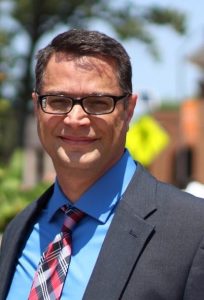ABPS Diplomate Marcos Rosado, MD, Explains What It’s Like to Specialize in Anesthesiology
 During a surgical internship after finishing medical school, I became curious about the guys “behind the drape” who were able to render the patient oblivious to pain and in a deep state of sleep. As part of my internship, I did a surgical rotation in the intensive care unit, where I had the opportunity to work with anesthesia residents who appreciated my hard work and dedication.
During a surgical internship after finishing medical school, I became curious about the guys “behind the drape” who were able to render the patient oblivious to pain and in a deep state of sleep. As part of my internship, I did a surgical rotation in the intensive care unit, where I had the opportunity to work with anesthesia residents who appreciated my hard work and dedication.
Midway through the internship, a position opened in the anesthesia department, and those residents immediately recommended me for the position. My wife was in labor the day when the anesthesia chief resident came to tell me about the position. He took me to meet the chair of anesthesia, and after a discussion with his staff, they offered me the anesthesia resident position. Later that day, my wife gave birth to our firstborn and I became a father and a future anesthesiologist. It was the best day of my life.
Anesthesiology is a good fit for me because it allows me the opportunity to care for patients of all ages, genders, and racial backgrounds, and get them through surgery in a comfortable and safe way. Every day I get the chance to listen to a diverse group of patients and alleviate their fears and pain.
What I enjoy most about practicing anesthesiology is the challenge of caring for patients with many different diseases presenting for a wide range of surgical procedures. Seeing patients’ happy faces after successful surgeries, comforting them during complications, and just spending time with them during a stressful part of their life—all of that makes my day every day.
As an anesthesiologist, my main challenge is dealing with patients with significant comorbidities and then customizing the safest and most effective anesthetic that will enhance their recovery as quickly as possible.
I remember in particular a patient who always became nauseated and vomited after anesthesia. I explained to her during her preoperative visit that by using a newer anesthetic agent with fewer side effects, we could do a regional block for her surgery. I don’t think she believed me much but agreed to proceed anyway. We performed an ultrasound-guided block with mild sedation, and she underwent surgery without complications. She did not get sick in the post-anesthesia recovery and was discharged home in satisfactory condition. She recovered well from surgery, and to this day, she has been thankful for our care.
If I could offer some advice to an anesthesiologist in training, I would say: Be compassionate, listen to your patients, answer all their questions and concerns, alleviate all their fears—and choose the safest anesthetic possible.






